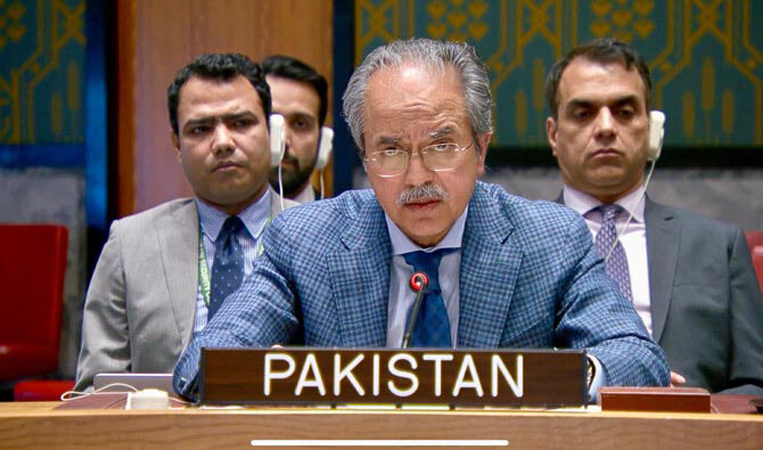 Pakistan has expressed deep concern over the recent violence in Syria’s coastal region, and urged the country’s interim authorities to protect all civilians in line with international law and conduct a credible investigation into the incidents.
Pakistan has expressed deep concern over the recent violence in Syria’s coastal region, and urged the country’s interim authorities to protect all civilians in line with international law and conduct a credible investigation into the incidents.
“Sectarian strife threatens to undermine peaceful political transition besides exacerbating the humanitarian challenge,” Ambassador Asim Iftikhar Ahmad, permanent representative of Pakistan to the United Nations, told the UN Security Council on Tuesday.
Since 6 March 2025, the coastal governorates of Hama, Homs, Latakia and Tartous have experienced a surge in violent attacks, leaving a wave of death, destruction and displacement. Six major hospitals and several ambulances have been damaged, and many civilians are reported to have been killed, including women and children.
“The resurgence of shocking violence, as has been reported, particularly along Syria’s western coast, is deeply concerning,” the Pakistani envoy said during a discussion on the political and humanitarian situation in Syria.
“Era of impunity must be in the past”, he said and welcomed the establishment of an independent committee by the Syrian interim authorities.
In this regard, Ambassador Asim said Pakistan remains hopeful that Syria’s new leadership will guide the nation toward an inclusive, stable and prosperous future.
“If at all there was a right time for the international community to engage and assist with this objective, it is now,” he added..
As regards Syria’s ongoing humanitarian and economic challenges, the Pakistani envoy called for robust international support for the UN’s transitional action plan, aimed at poverty reduction, refugee reintegration and institutional strengthening.
In this regard, he added, lifting of unilateral sanctions was imperative to facilitating reconstruction and aid efforts.
While remaining vigilant against entities with known affiliation to terrorist organizations, he said a reassessment and drawdown of the UN sanctions regime is also warranted to ensure that essential economic and humanitarian initiatives are not hindered.
A Syrian-led and Syrian-owned political process, facilitated by the United Nations, remains the key to sustainable peace, Ambassador Asim said, adding that the political, economic, security, and humanitarian challenges facing Syria demanded a holistic and coordinated response.
The Pakistani envoy voiced concern over Israel’s continuing incursions and airstrikes into Syrian territory in violations of the 1974 Disengagement of Forces Agreement, and it’s declared intent for an “indefinite” presence, and “full demilitarization of southern Syria” These measures, he said, were unacceptable, as they constitute blatant violation of Syria’s sovereignty and territorial integrity, and undermine international law and regional stability.
“We echo the (UN) Special Envoy’s condemnation of these illegal actions and Israeli military escalations in Syria, and reaffirm this Council’s March Presidential Statement, which upholds Syria’s sovereignty, unity, and territorial integrity, and specifically calls on all States to respect these principles and to refrain from any action or interference that may further destabilize Syria.
“Israel must cease its incursions forthwith and this Council must hold Israel to its obligations.”
Welcoming Syria’s new interim Constitution as a critical step towards the restoration of the rule of law, he termed the National Dialogue Conference held last month as a positive step, hoping that forthcoming appointment of an Interim Government, Legislative Council, and Constitutional Committee would reflect Syria’s diversity and foster inclusive and representative governance.
“We recognize the regional and international efforts, such as the meetings in Aqaba, Riyadh, Amman, Paris and Brussels that underscore global commitment to Syria’s peaceful transition and reintegration into the international community,” he added.
The agreement between Syria’s interim government and the Syrian Democratic Forces (SDF) aimed at integrating all civil and military institutions, marks a significant step toward national unity, he said.
However, Asim also added in the same breath that the persistent terrorist threat, particularly from al-Qaeda and ISIS affiliates and foreign terrorist fighters was still a grave concern. He asked the UN’ s 1267 Sanctions Committee and its Monitoring Team to continue their vigilant assessment to prevent any resurgence of terrorism.
Ambassador Asim also drew the attention of the international community to the grave humanitarian crisis in Syria with over 16.5 million people in urgent need of assistance.
“More than 90% of Syrians live in poverty, and over half the population is food insecure. The international community must intensify efforts to address these urgent needs while also supporting Syria’s long-term recovery.”